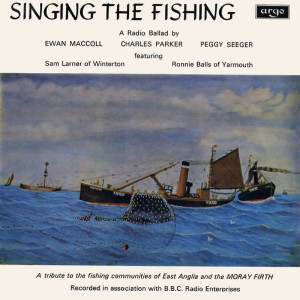 Sean Laffey contributed this review.
Sean Laffey contributed this review.
Veteran Irish folk singer Liam Clancy tells a story of a time back in the sixties when he was over in London, having some time on his hands and being young and naive and it must be said with a little trepidation, he telephoned Ewan MacColl (the great man had a fearsome reputation in folk circles, and an audience at his court was never given lightly). A meeting was arranged and Clancy dutifully went along to MacColl’s home, the evening went well, the two clicked and songs, laughter and talk took them into the small hours of the night. When MacColl brought out his radio ballad, “Wi Our Nets and Gear,” Liam immediately suggested an alternative title, “The Wild and Wasteful Ocean.” Great title but it didn’t stick, the song has come down to us as “The Shoals of Herring.”
This tells us a lot about the folk process, the power of MacColl’s writing, and the cultural importance of National broadcasting by the BBC, which gave a non-commercial platform to the music in an age when the audience had yet to succumb to the aural bubblegum of MTV and its ilk. The fascinating story behind this song, as with many more on this disc, is how the words were collated. In the late 1950s BBC producer Charles Parker along with MacColl and his American wife Peggy Seeger set about a series of radio documentaries, using the newly developed reel-to-reel tape recorders. In a period from 1957 to 1964 they collected thousands of hours of “actuality recordings,” where ordinary people told of their working lives. Into these programmes MacColl wove a tapestry of new songs, in a more of less traditional style, sometimes shifting the emphasis towards a jazz or blues sensibility, which gives the songs such a musical freshness, it is often hard to believe they are 40 years old.
In this series MacColl consciously combined his songwriting genius and strong socialist principles, it could all have become too academic as he sifted through hours of tape for original pearls of working class wisdom. But his years in the theatre gave him the essential insight that would turn dry social studies into infotainment, without the sugary sanitation that the Disney studios might bring to such a work. Case in point, it is said that the “Shoals of Herring” is almost entirely made from the comments of East coast fishermen, the one phrase that comes from the inkwell being “The Wild and Wasteful Ocean” and that’s from Shakespeare, (moral: if you are go to plagiarise do it from the best pupil in the class).
Topic Records are to be congratulated in bringing this album to a wider audience. The original series on the radio was too expensive to sustain by even the BBC; the thousands of hours of field work that went into each programme could not be justified, yet it set a number of benchmarks in the crafts of radio production, folk singing and social documentary. As an introduction to maritime music, it may fall a little short of the authentic, or indeed romantic – no tales of Rio here, but you’ll be hard pressed to find anything that has as much salt spray in the tracks. in a curious way the music which is folk art rather than traditional, triumphantly to endows the whole project with a sense of acute reality.
In an age when much folk music has lost touch with its underlying narrative, Singing the Fishing is a reminder of the magnificent potential that is locked inside this art form. Could this ever happen again? It is very unlikely, as the budgets aren’t there, the audience is now fragmented by an ever increasing choice of entertainment channels, technology has changed so much that workers no longer sing songs about their jobs; indeed the community of labour is a paler thing now than it was in the late 50s. But, we do have this as an archive of a time when it was all possible, and the paymasters had the guts and imagination to run with it. Suffice to say, no folk song collection is complete without this disc.
(Topic Records, 2002)
